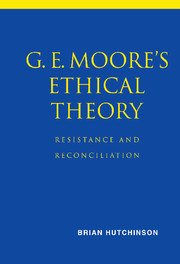Book contents
- Frontmatter
- Contents
- Introduction: Irony, Naïveté, and Moore
- 1 Simplicity, Indefinability, Nonnaturalness
- 2 Good's Nonnaturalness
- 3 The Paradox of Ethics and Its Resolution
- 4 The Status of Ethics: Dimming the Future and Brightening the Past
- 5 The Origin of the Awareness of Good and the Theory of Common Sense
- 6 Moore's Argument Against Egoism
- 7 The Diagnosis of Egoism and the Consequences of Its Rejection
- 8 Moore's Practical and Political Philosophy
- 9 Moore's Cosmic Conservatism
- 10 Cosmic Conservatism II
- Bibliography
- Index
8 - Moore's Practical and Political Philosophy
Published online by Cambridge University Press: 28 July 2009
- Frontmatter
- Contents
- Introduction: Irony, Naïveté, and Moore
- 1 Simplicity, Indefinability, Nonnaturalness
- 2 Good's Nonnaturalness
- 3 The Paradox of Ethics and Its Resolution
- 4 The Status of Ethics: Dimming the Future and Brightening the Past
- 5 The Origin of the Awareness of Good and the Theory of Common Sense
- 6 Moore's Argument Against Egoism
- 7 The Diagnosis of Egoism and the Consequences of Its Rejection
- 8 Moore's Practical and Political Philosophy
- 9 Moore's Cosmic Conservatism
- 10 Cosmic Conservatism II
- Bibliography
- Index
Summary
Introduction
In this chapter, we consider Moore's views on practical and political philosophy, which he presents in Principia's fifth chapter, “Ethics in Relation to Conduct.” Our focus will be on his discussion of the proper attitude to take toward the vast array of moral and social rules we confront as we make our decisions about what we ought to do. As we have elsewhere, we will find his thought to manifest both conservative and revolutionary impulses, with some of the things he says bespeaking a great deal of respect for rules and others sounding as though he considers most of them to be quite unimportant to morality and perhaps even an impediment to it.
To resolve this tension, we must explore the distinctions he makes between three broad, rather vaguely delineated classes of rules: 1) Rules found in all societies that must be widely followed if there is to be the civilized life necessary for there being much or anything at all of value. 2) Rules in place in various societies that are not absolutely necessary for there being civilized life. 3) Rules not in place in a society that some philosopher or philosophically minded reformer wishes to impose on it or perhaps even on all societies. It is uncontroversial that Moore is conservative with respect to the first and the third of these classes of rules.
- Type
- Chapter
- Information
- G. E. Moore's Ethical TheoryResistance and Reconciliation, pp. 146 - 171Publisher: Cambridge University PressPrint publication year: 2001



